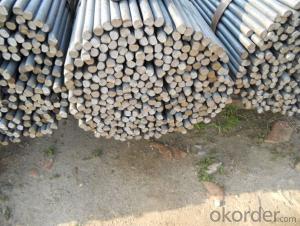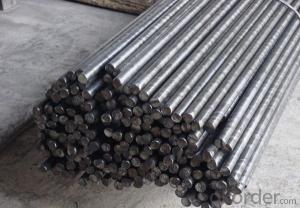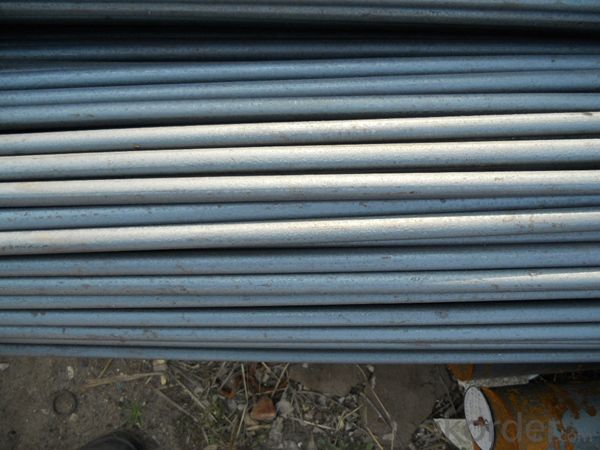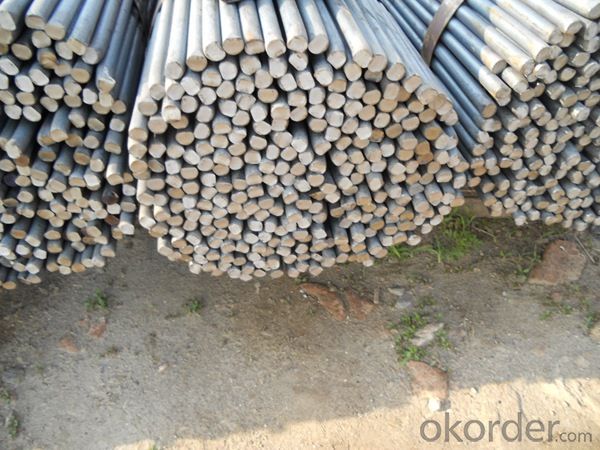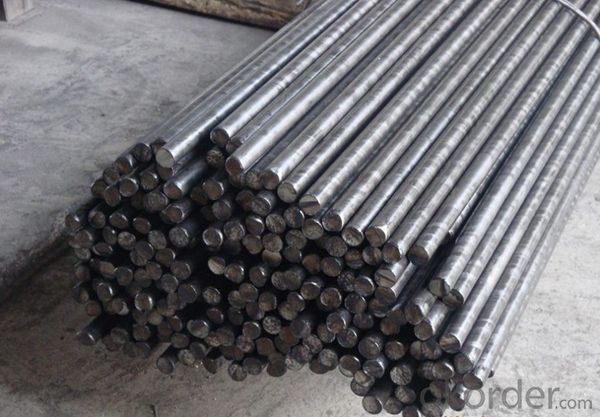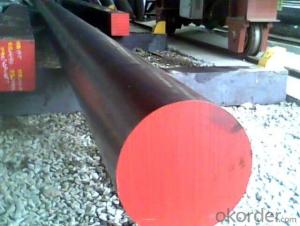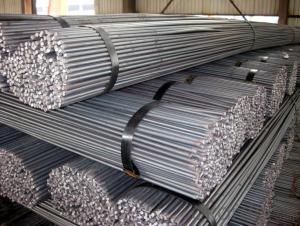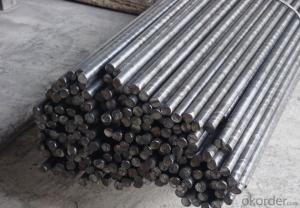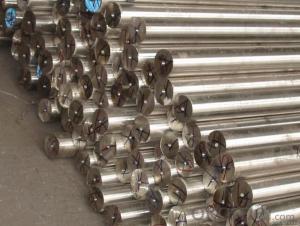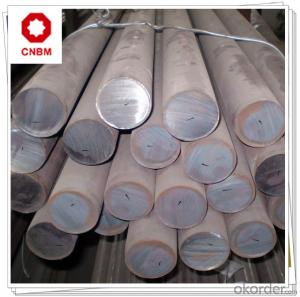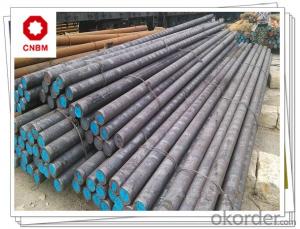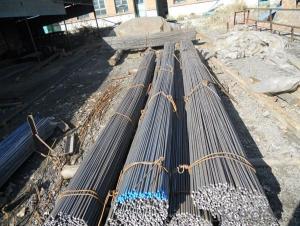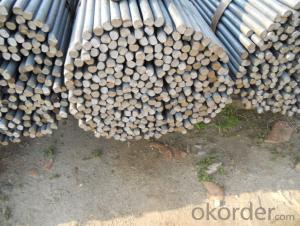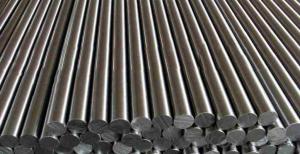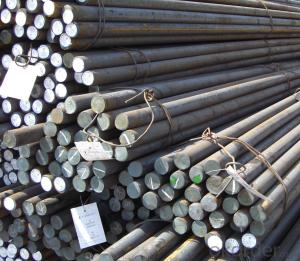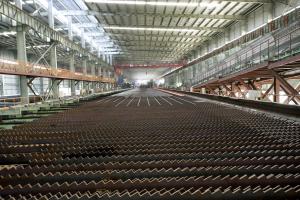Low Carbon Hot Rolled Steel Round Bars for Bults and Nults
- Loading Port:
- Tianjin
- Payment Terms:
- TT or LC
- Min Order Qty:
- 25 m.t.
- Supply Capability:
- 200000 m.t./month
OKorder Service Pledge
OKorder Financial Service
You Might Also Like
Product Description:
OKorder is offering Low Carbon Hot Rolled Steel Round Bars for Bults and Nults at great prices with worldwide shipping. Our supplier is a world-class manufacturer of steel, with our products utilized the world over. OKorder annually supplies products to European, North American and Asian markets. We provide quotations within 24 hours of receiving an inquiry and guarantee competitive prices.
Product Applications:
1. Low Carbon Hot Rolled Steel Round Bars for Bults and Nultsis mostly used for straight bundles supply, and used for steel, bolts and various mechanical parts. While the bigger round bar, or more than 25mm hot rolled bar, is mainly for the manufacture of mechanical parts or for seamless steel billet.
2. Low Carbon Hot Rolled Steel Round Bars for Bults and Nultsis used in construction and a large number of architectural and engineering structures.
3. Besides, we can supply some especial material steel round bar that can be used for main shaft of steamer, hummer shank, with big section and supper force.
Product Advantages:
OKorder's Low Carbon Hot Rolled Steel Round Bars for Bults and Nults are durable, strong, and resist corrosion.
1. The steel in which the main interstitial alloying constituent is carbon in the range of 0.12–2.0%.
2. As the carbon percentage content rises, steel has the ability to become harder and stronger through heat treating; however it becomes less ductile.
3. Regardless of the heat treatment, higher carbon content reduces weld ability. In carbon steels, the higher carbon content lowers the melting point
Main Product Features:
· Premium quality
· Prompt delivery & seaworthy packing (30 days after receiving deposit)
· Corrosion resistance
· Can be recycled and reused
· Mill test certification
· Professional Service
· Competitive pricing
Specifications of Low Carbon Hot Rolled Steel Round Bars for Bults and Nults
1. Grade: Q195, Q235, A36, SS400, Q345
2. Material: Mild carbon steel
3. Diameter: 8mm-150mm
4. Length: 6m, 9m, 12m
5. Quenching methods: oil quenching, air cooling or salt bath quenching
6. Heat treatment: Isothermal annealing temperature is 800~880 °C, with 10~20 °C, the furnace cooling to about 600 °C
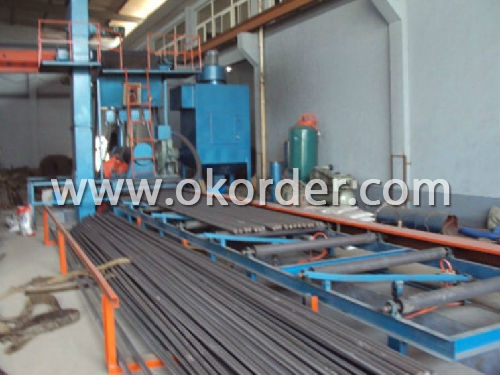
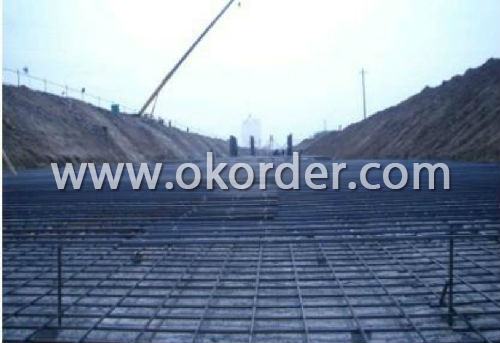
Packaging & Delivery of Low Carbon Hot Rolled Steel Round Bars for Bults and Nults
Packaging Detail: All goods are packed in bundle with steel strips and shipped by break bulk vessel or container (depend on target market and different ports)
Delivery Detail: 45 days
Trade terms: FOB, CFR, CIF
MOQ: 25 tons per specification; we can negotiate the quantity if the specification is normal or we have stock of one specification.
Weight: The price invoicing on theoretical weight basis or actual weight basis depends on customer’s request.
Shipment: The shipment of bulk break or container is depends on customer’s request and the situation of the port of destination.
Documents given: Full set of original clean on board bill of lading; Original signed commercial invoice; Original packing list; Policy of insurance; Certificate of origin and what the target market needs.
Quality Assurance of Low Carbon Hot Rolled Steel Round Bars for Bults and Nults
1. We will strictly inspect our production that we sold according to the customer’s request.
2. Quality should be in conformity with the specification of the manufacturer. Quantity and packing conditions should be in conformity with the term in the contract.
3. Should the packing found damaged, the buyer has the right to claim to the seller.
FAQ:
Q1: Can fit in the containers of 20fts the steel beams of 6M?
A1: No proble, we can put them into the containers in the form sideling.
Q2: The products are invoicing on theoritical weight or on actual weight?
A2: We can do it in both manners, according to the customers' request.
Q3: How soon can we receive the product after purchase?
A3: Within three days of placing an order, we will begin production. The specific shipping date is dependent upon international and government factors, but is typically 7 to 10 workdays.
- Q: How do you measure the straightness of a steel round bar?
- There exist several methods for measuring the straightness of a steel round bar. One commonly employed approach involves using a straight edge or ruler, which is positioned along the length of the bar to check for any gaps or deviations. If the bar is completely straight, it should make contact with the straight edge throughout its entire length. Any gaps or deviations indicate that the bar is not perfectly straight. Another method involves the utilization of a laser alignment system. This method entails placing the round bar on a flat surface and projecting a line along its length using a laser. The projected line will reveal any deviations or bends in the bar. This method provides a more precise measurement of straightness. Moreover, a dial indicator, a precision measuring instrument, can also be employed. This device includes a small probe that is placed against the surface of the round bar. As the bar is rotated, the dial indicator will measure any variations in the surface, thereby indicating any bends or deviations from straightness. It is worth noting that the required level of straightness will vary depending on the specific application of the steel round bar. In certain cases, a slight deviation may be acceptable, while in others, a high level of straightness may be imperative.
- Q: Are steel round bars resistant to fire?
- Steel round bars are highly resistant to fire. Steel is known for its excellent fire resistance properties due to its high melting point and low thermal conductivity. In the event of a fire, steel round bars will not easily ignite or burn. Additionally, steel's structural integrity remains intact even at high temperatures, making it a preferable choice for construction materials in fire-prone areas. This resistance to fire makes steel round bars a reliable and safe option for various applications, including building structures, industrial equipment, and fire-resistant barriers.
- Q: What is the minimum yield strength of steel round bars?
- The minimum yield strength of steel round bars can vary depending on the specific grade and type of steel being used. However, most commonly used carbon steels have a minimum yield strength of around 36,000 to 50,000 pounds per square inch (psi).
- Q: Can steel round bars be used in the packaging industry?
- Certainly! Steel round bars have a wide range of applications in the packaging industry. More specifically, they are commonly utilized to add structural support and enhance the strength of various packaging materials. These bars can function as reinforcement bars or support rods in packaging crates, pallets, and containers. Notably, steel round bars are renowned for their exceptional strength and durability, which makes them well-suited to withstand heavy loads and maintain the integrity of the packaging materials during transportation and storage. Furthermore, steel round bars can be easily customized and cut to the desired length, allowing for flexibility in packaging design and meeting specific requirements. In summary, incorporating steel round bars in the packaging industry greatly enhances the safety, stability, and safeguarding of packaged products.
- Q: What are the different heat treatment methods for steel round bars?
- Steel round bars can undergo various heat treatment methods to enhance their mechanical properties and overall performance. These methods, namely annealing, normalizing, quenching, tempering, and case hardening, are commonly employed. 1. Annealing: By subjecting the steel round bars to a specific temperature and maintaining it for a certain duration, annealing achieves a uniform microstructure. This treatment alleviates internal stresses, improves ductility, and enhances machinability. 2. Normalizing: This technique involves heating the steel round bars slightly above their critical transformation temperature and subsequently cooling them in still air. Normalizing refines the grain structure, enhances mechanical properties, and improves resistance to impact and fatigue. 3. Quenching: The process of quenching entails heating the steel round bars above their critical temperature and rapidly cooling them by immersion in a quenching medium like oil, water, or brine. This rapid cooling hardens the steel, rendering it stronger and more resistant to wear and abrasion. However, quenched steel may exhibit brittleness, necessitating additional heat treatment steps. 4. Tempering: Following the quenching process, tempering is often employed to reduce brittleness and enhance toughness. Tempering involves reheating the quenched steel to a specific temperature and holding it there for a designated time, followed by gradual cooling. This procedure alleviates internal stresses, improves ductility, and enhances overall toughness and machinability. 5. Case Hardening: Case hardening is a surface heat treatment method that increases the hardness of the outer layer of steel round bars while maintaining a relatively softer core. This technique involves heating the steel in a carbon-rich environment, such as a gas or salt bath, and subsequently quenching it to achieve a hardened outer layer. Case hardening improves wear resistance and fatigue strength, making it suitable for applications requiring high surface hardness. It is crucial to note that the selection of the specific heat treatment method for steel round bars depends on the desired mechanical properties and intended application. Manufacturers meticulously choose the appropriate heat treatment method based on factors such as steel composition, desired hardness, and required strength.
- Q: Are steel round bars suitable for high-temperature applications?
- Steel round bars can be suitable for high-temperature applications depending on the specific grade and composition of the steel. Certain grades of steel, such as stainless steel or heat-resistant alloys, are specifically designed to withstand high temperatures without losing their mechanical properties. These steel grades have high melting points, excellent heat resistance, and good oxidation resistance, making them ideal for applications in industries such as aerospace, automotive, and power generation. Stainless steel round bars, for example, exhibit excellent corrosion resistance and high strength at elevated temperatures. They can withstand temperatures up to 800-900 degrees Celsius without significant loss of mechanical properties. Additionally, heat-resistant alloys like Inconel or Hastelloy are used in extreme high-temperature environments, such as gas turbines or petrochemical plants, where temperatures can exceed 1000 degrees Celsius. However, not all steel round bars are suitable for high-temperature applications. Carbon steels, for instance, are prone to oxidation and loss of strength at elevated temperatures. Low-grade steel round bars may also experience deformation, softening, or even failure under high-temperature conditions. Therefore, it is crucial to select the appropriate steel grade and consult with experts or engineers to determine the suitability of steel round bars for specific high-temperature applications.
- Q: Can steel round bars be used in the agriculture industry?
- Yes, steel round bars can be used in the agriculture industry. They are commonly used for applications such as building fences, constructing equipment, and supporting structures for agricultural buildings. Steel round bars offer durability, strength, and versatility, making them suitable for various agricultural applications.
- Q: Can steel round bars be used in the renewable energy industry?
- Indeed, in the renewable energy industry, steel round bars find utility. Their versatility and durability render them fitting for diverse applications within renewable energy projects. As an illustration, they serve as support structures for solar panels, wind turbine towers, and hydroelectric power plants. The steel round bars furnish the requisite strength and stability to endure the adverse environmental conditions frequently encountered in renewable energy projects. Moreover, steel is a material highly amenable to recycling, thereby aligning with the sustainable principles upheld by the renewable energy industry. Consequently, steel round bars represent a feasible and frequently employed constituent in the construction and advancement of renewable energy infrastructure.
- Q: Can steel round bars be used in the production of tools?
- Yes, steel round bars can definitely be used in the production of tools. Steel is widely used in tool manufacturing due to its excellent strength, durability, and versatility. Steel round bars, in particular, are commonly utilized for their ability to be machined, forged, and heat-treated into various tool components such as cutting edges, shafts, handles, and dies. The high tensile strength and resistance to wear and corrosion make steel round bars an ideal choice for tool production, ensuring the longevity and performance of the tools. Additionally, steel can be easily customized and shaped to meet the specific requirements of different tools, making it a preferred material in the industry.
- Q: How do you prevent warping during welding of steel round bars?
- To prevent warping during welding of steel round bars, there are several precautions that can be taken: 1. Proper fit-up: Ensure that the round bars are properly aligned and fit together before welding. Any gaps or misalignments can lead to uneven heating and cooling, increasing the chances of warping. 2. Welding sequence: Divide the welding into multiple smaller sections or segments instead of welding continuously along the entire length of the round bar. This will help distribute the heat more evenly and reduce the risk of warping. 3. Welding technique: Use a welding technique that minimizes heat input, such as pulse welding or tack welding. These techniques allow for controlled and intermittent heating, which reduces the chances of warping. 4. Preheating: Preheating the round bars before welding can also help prevent warping. This is especially important for thicker bars or when welding dissimilar metals. Preheating helps to reduce the temperature gradient between the weld and the surrounding material, minimizing the risk of warping. 5. Heat control: Monitor and control the heat input during welding. Excessive heat can cause rapid expansion and contraction, leading to warping. Use appropriate welding parameters, such as lower amperage and shorter welding times, to control the heat input. 6. Welding fixtures: Use welding fixtures or jigs to hold the round bars in place during welding. This helps to maintain proper alignment and prevents movement during the welding process, reducing the chances of warping. 7. Post-welding cooling: Allow the welded round bars to cool down slowly and naturally. Avoid rapid cooling methods like quenching, as they can induce stress and increase the risk of warping. By implementing these measures, the risk of warping during welding of steel round bars can be significantly reduced, resulting in better quality and more reliable welded joints.
Send your message to us
Low Carbon Hot Rolled Steel Round Bars for Bults and Nults
- Loading Port:
- Tianjin
- Payment Terms:
- TT or LC
- Min Order Qty:
- 25 m.t.
- Supply Capability:
- 200000 m.t./month
OKorder Service Pledge
OKorder Financial Service
Similar products
Hot products
Hot Searches

